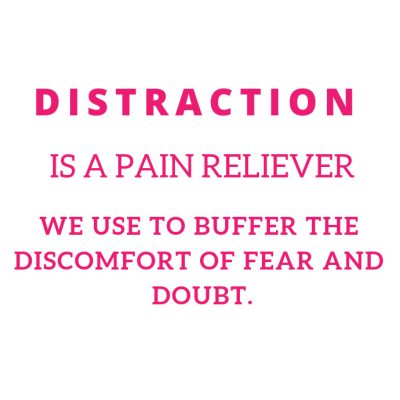Raise your hand if you’ve ever engaged in short-term distractions to avoid doing the work you know will reap long-term benefits.
If your hand isn’t up in the air, you can stop reading and go have #disciplined tattooed on your forehead.
Seriously, you are amazing and everyone should know it.
For the rest of us, distractions such as: assisting others, scrolling through social media, shopping, watching television or other quick, low hanging dopamine hits impede our progress toward what we truly desire in the long-term.
Much like a person addicted to drugs self-medicates to relieve his pain, distraction is a form of pain relief to the person experiencing fear and doubt.
Unfortunately, using short-term distraction as a pain reliever can quickly become your default reaction to discomfort.
And this, my friend, is a set-up for long-term disappointment.
What’s one easy strategy for preventing distraction from becoming your default?
Find an accountability partner who will hold you to your commitments.

Partnering with the right person makes all the difference
Partnering with someone who knows what you’re trying to achieve, believes in you, and most importantly, will call you out on your bullsh*t – helping you move toward what you want and away from distractions.
You can partner with a colleague, a coach, family member, or friend.
With one caveat – your partner must be committed to helping you grow, not a person who encourages goal sabotage by saying, “Yeah skip that walk, you worked out yesterday” or “you deserve a cookie, look how hard you worked today” or “Retail therapy is effective.” Not when your goal is to walk 10,000 steps each day, lose 10 pounds or write a manuscript.
Rather than giving you an out, your accountability partner motivates you to stay the course by asking curious questions when you’re working through an issue or direct questions to keep you on task.
For example, when I told my accountability partner that I planned to invite the Chief Nursing Officer of a local hospital to lunch to discuss how I could help this CNO get more nurses through their door. My accountability partner asked me, “What day are you emailing the CNO to invite her for lunch?”
Notice, how she made me commit to a specific day rather than allowing me an out with a nebulous when-I-feel-like-it timeline. I committed to a day that I would email the CNO. And good thing. Because I know for a fact, I would have stalled in completing this priority task if I hadn’t committed to a completion date. (And from this, I have a February lunch date scheduled with said CNO.)
Take that, distractions!
And the benefits of taking committed action rather than succumbing to distraction (besides achieving your goal)?
You gain confidence in yourself, feeling empowered to take the next step, every time you refrain from using distraction as pain relief.
More Good Questions to Use with Accountability Partners:
Questions to Enhance Motivation and Decrease Fear and Doubt What will be different when you complete your priority task this week? How will completing your priority tasks affect other areas of your life? What step will you take in the next 24 hours toward your priority?
Questions to Foster Momentum How will you celebrate your wins?
Questions to Prevent Overwhelm Procrastination Paralysis If you could only do one thing this week, what would it be? What is one task that if you completed it would make everything else easier or unnecessary? (From the book: The One Thing)
Questions to Keep Your Partner Out of the Quicksand of Fear and Doubt What barriers might you face this week? What is your plan for when those barriers arise? What would set you up for success this week?
Using forward moving questions like these works beautifully in accountability situations. They’re also fantastic questions to use when mentoring or teaching.
Having an effective accountability partner is a great strategy to minimize using distractions as pain relievers because meeting deadlines and commitments leave no room for dawdling with distractions.
Who might you ask today to be your accountability partner, a partner who will help you stay on course to meet your goals?
Go ask that person today.
Your future will be glad you did.
Caring about you,


Comments
Add Comment